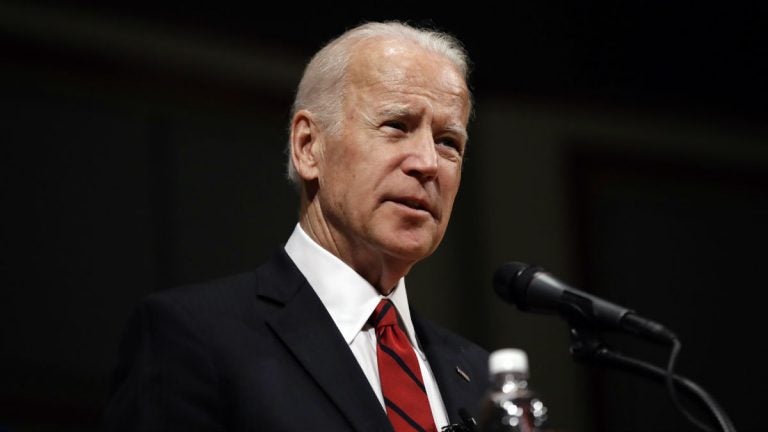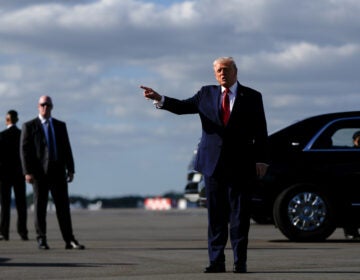Once again, Joe is Biden his time
This is so deja vu. It feels like a reprise of summer '15, when speculation was rampant that Joe might challenge Hillary Clinton for the '16 nomination.

(Patrick Semansky/AP Photo, file)
In the new issue of Vanity Fair, there’s a priceless passage about the next presidential race: “Asked for his current state of mind about 2020, Joe Biden ruled nothing out.” Biden told the magazine: “I haven’t decided to run, but I’ve decided I’m not going to decide not to run.”
Here we go again. Hamlet meets “Groundhog Day.”
You may have noticed Joe’s latest trial balloon. I don’t mean to insinuate that his current book tour, sharing the pain of losing his son Beau, is a cynical bid to boost his profile for 2020, but the autumn release of the memoir clearly coincides with his nascent moves to write a third act in public life. The ex-veep has launched a political action committee, American Possibilities, which is raising money that will be dispensed to Democratic candidates in 2018 . He has been writing op-ed columns and giving speeches about the perils of Trumpism, which in his words, threatens our “invisible moral fabric.” His book tour will stop in battleground states like Wisconsin, North Carolina, and Michigan.
And he has dispatched allies to leak his interest in 2020 — as evidenced by this Nov. 10 paragraph in Politico: “Joe Biden thinks it’s critical that Donald Trump not get a second term — and though it’s early, he doesn’t yet see anyone else who could stop that from happening. So, he’s been telling people privately, that might mean he’ll just have to run himself.” (He’s telling people “privately,” so that they can spin it publicly.) Then he went on Stephen Colbert’s show, and when the host invoked the prospect of 2020, to audience applause, he demurred with the show of humility that we Americans require of our reluctant warriors.
This is so deja vu. It feels like a reprise of summer ’15, when speculation was rampant that Joe might challenge Hillary Clinton for the ’16 nomination. As I wrote at the time, Hillary’s email baggage had created a potential opening; on the other hand, Hillary was way ahead on fundraising (Joe had raised nothing), President Obama was reportedly signaling that ’16 was Hillary’s turn, and Joe’s grieving for Beau had drained his energy. Plus, he had twice flopped as a presidential candidate, in ’88 and ’08, and he had stuff in his record that liberals didn’t like.
Ultimately, of course, he passed on ’16. But I can see why he’s tantalized about a last hurrah in ’20. The downsides are equally obvious — and we’ll get to those in a moment — but first let’s indulge him.
The current White House occupant is a hate machine derided by his own Secretary of State as a “moron,” and by his own National Security Adviser as a “kindergartner” — whereas Joe, a likeable and authentic soul, seems well suited to reap an electoral backlash. Whereas the current occupant is notoriously ignorant on policy and governance, Joe has 44 years of federal experience and foreign policy friends all over the world. Whereas the current occupant is inherently divisive, Joe takes pride in working across the aisle. And the former hardscrabble kid from Scranton could conceivably use his down-to-earth style to win back the small cities and towns that put Trump over the top in Pennsylvania.
On the other hand.
I hate to mention this, for fear of sounding ageist, but if Joe were to run and win in 2020, he would be 78 on Inauguration Day. Last I heard, the big job can be relentlessly exhausting, at least for real presidents. Joe currently looks fit at 74, and maybe, in his case, 74 is the new 60. But for better or worse, optics matter in politics, and with Millennials potentially surging into the electorate, it might benefit the Democrats to showcase a new, younger generation of candidates. Because if Joe were to announce, the jokes would start. They always do. When Bob Dole ran for the GOP at age 73, David Letterman said: “A lot of people would look at a glass as half empty. Bob Dole looks at the glass and says, ‘What a great place to put my teeth.’ “) When John McCain ran at age 71, Letterman called him “the kind of guy who picks up the TV remote when the phone rings.”
Also, the Democratic base has been moving left; litmus-testers would surely dredge up Joe’s chumminess with the banks and credit card companies that are headquartered in his home state of Delaware. In 2005, as a senator, he supported a bill — ultimately signed by President Bush — that made it harder for tapped-out consumers to file for bankruptcy. Joe had voted for a similar bill in 2001. And, perhaps coincidentally, his son Hunter earned consulting fees from a major banking company, MBNA Corp., during the same period (2001 to 2005) when these bankruptcy bills were in the hopper. Rest assured, this stuff would come up again.
And since fortuitous timing is crucial to success, it’s equally true that bad timing portends failure. Joe might have missed his moment.
The current focus on sexual assault and harassment has arguably created a more bullish market for female candidates, and at least four — Senators Elizabeth Warren, Kirsten Gillibrand, Kamala Harris, Amy Kobuchar — seem interested in the ’20 nod. I wouldn’t want to predict how an old white guy (or two, if we include Bernie Sanders) would fare in such a field, but I suspect he wouldn’t have an easy time. Especially if female primary voters were to learn that Senator Joe was less than friendly to Anita Hill in 1991 when she testified that she’d been sexually harassed by high court nominee Clarence Thomas.
All speculation aside, Joe does have a message. He spelled it out earlier this month in a Chicago speech: “How many of you, when (Trump) was elected, were either happy or bemused or a little embarrassed or not quite sure, but now are really fundamentally worried about our democracy or the prospect of an international conflict or nuclear war? How many of you … are beginning to wonder whether or not the very roots of the invisible moral fabric that holds everything up is eroding in a way that’s going to be dangerous for democratic institutions?”
The message is self-evidently potent. The question, not for the first time, is whether he’s the best messenger.
WHYY is your source for fact-based, in-depth journalism and information. As a nonprofit organization, we rely on financial support from readers like you. Please give today.




